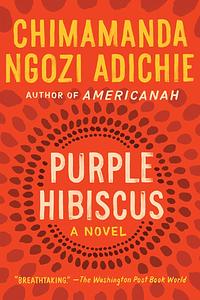Take a photo of a barcode or cover
challenging
dark
emotional
reflective
sad
tense
medium-paced
Plot or Character Driven:
A mix
Strong character development:
Yes
Loveable characters:
Yes
Diverse cast of characters:
No
Flaws of characters a main focus:
Yes
From the first line, very evocative of Things Fall Apart. Well-paced emotional read.
emotional
reflective
sad
slow-paced
Plot or Character Driven:
Character
Strong character development:
Yes
Loveable characters:
Complicated
Diverse cast of characters:
No
Flaws of characters a main focus:
Complicated
Back in my day, we had Margaret Atwood's absolutely superb [b:The Handmaid's Tale|38447|The Handmaid's Tale|Margaret Atwood|http://photo.goodreads.com/books/1294702760s/38447.jpg|1119185] for GCSE English. Little did I know how lucky I was to be given a book of speculative fiction to study: the syllabus rarely features any novels beyond the modernist 'humanist' novels. Adichie's Purple Hibiscus was shortlisted for the Orange prize for fiction the same year that Atwood's [b:Oryx and Crake|46756|Oryx and Crake (MaddAddam Trilogy, #1)|Margaret Atwood|http://photo.goodreads.com/books/1327896599s/46756.jpg|3143431] was. Neither of them won.
Perhaps the inevitable comparisons I drew between Atwood and Adichie, one whom I had to study and the other whom I had to teach, somehow diminished Adichie's accomplishments. At the same time however, I believe it gave me perspective. The novel's three stars are gained not by excellent writing in fact, but by their humanist sense of universal empathy. The novel's symbolism is obvious and if one was too entranced by the story to realise their meaning, Adichie all too willingly gives the reader simplistic explanations: red stands for oppressive religion, green stands for the so-called 'freedom' of the recent coup, purple stands above all for true freedom: freedom to be, freedom to do.
The description is occasionally repetitive, for example, Adichie compares bruises to the purple of an avocado more than once in the novel. I doubt it was for emphasis. The same points or scenes are made over and over again in cyclical form like the Mother cleaning her little statuettes or how the 'free spiritedness' of Aunty Ifeoma's family was always made in reference to how easily they laughed.
I can't help feeling this novel covers no new interesting ground. It may be fine for those who haven't yet had their fill of novels who dream up a humanistic project of humanity beyond the limits of religion or race, but I found its aims stale, its symmetry and neatness somewhat dull. I feel sorry to have to review a book I wanted so desperately to like: a feminist from Nigeria making her name occupy the same space as Atwood's. Ultimately however, she's going to have to dream bigger than this. Some writers make an excellent debut and eventually wither away, others write their magnum opus later in their career. I hope Adichie is the latter kind.
Perhaps the inevitable comparisons I drew between Atwood and Adichie, one whom I had to study and the other whom I had to teach, somehow diminished Adichie's accomplishments. At the same time however, I believe it gave me perspective. The novel's three stars are gained not by excellent writing in fact, but by their humanist sense of universal empathy. The novel's symbolism is obvious and if one was too entranced by the story to realise their meaning, Adichie all too willingly gives the reader simplistic explanations: red stands for oppressive religion, green stands for the so-called 'freedom' of the recent coup, purple stands above all for true freedom: freedom to be, freedom to do.
The description is occasionally repetitive, for example, Adichie compares bruises to the purple of an avocado more than once in the novel. I doubt it was for emphasis. The same points or scenes are made over and over again in cyclical form like the Mother cleaning her little statuettes or how the 'free spiritedness' of Aunty Ifeoma's family was always made in reference to how easily they laughed.
I can't help feeling this novel covers no new interesting ground. It may be fine for those who haven't yet had their fill of novels who dream up a humanistic project of humanity beyond the limits of religion or race, but I found its aims stale, its symmetry and neatness somewhat dull. I feel sorry to have to review a book I wanted so desperately to like: a feminist from Nigeria making her name occupy the same space as Atwood's. Ultimately however, she's going to have to dream bigger than this. Some writers make an excellent debut and eventually wither away, others write their magnum opus later in their career. I hope Adichie is the latter kind.
dark
emotional
inspiring
medium-paced
Plot or Character Driven:
Character
Strong character development:
Yes
Loveable characters:
Yes
Diverse cast of characters:
Yes
Flaws of characters a main focus:
No
emotional
hopeful
reflective
sad
tense
medium-paced
Plot or Character Driven:
Character
Strong character development:
Yes
Loveable characters:
Yes
Diverse cast of characters:
No
Flaws of characters a main focus:
Complicated
Complex characters in a complex context, evolving and changing as the story progresses. A difficult read at times, it never dwells on the tough experiences the protagonist goes through, but always creates nuances that raise conflicting emotions. Beautifully written.
emotional
informative
medium-paced
dark
emotional
informative
reflective
tense
Plot or Character Driven:
Character
Strong character development:
Yes
Loveable characters:
Complicated
Diverse cast of characters:
Yes
Flaws of characters a main focus:
Yes
Graphic: Child abuse
challenging
dark
emotional
sad
fast-paced
Plot or Character Driven:
Plot
Strong character development:
Yes
Loveable characters:
Complicated
Diverse cast of characters:
Yes
Flaws of characters a main focus:
Yes
Graphic: Domestic abuse, Physical abuse
Moderate: Miscarriage, Racism


